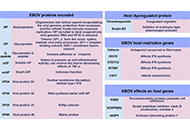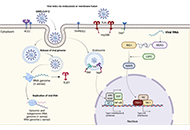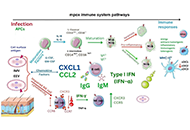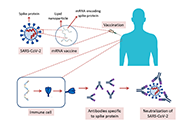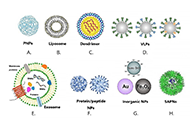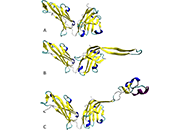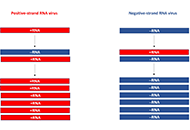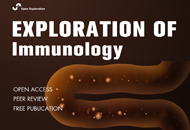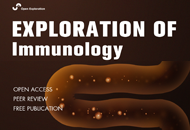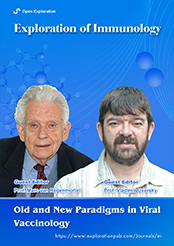
Old and New Paradigms in Viral Vaccinology
Guest Editors
Dr. Marc H.V. Van Regenmortel E-Mail
Retired Emeritus CNRS Director, School of Biotechnology, 300 Boulevard Sébastien Brant, 67412 ILLKIRCH, France
Research Keywords: General virology, immunochemistry of viruses, viral taxonomy, synthetic peptide vaccine, viral diagnostics, SPR biosensors
Dr. Vladimir N. Uversky E-Mail
Department of Molecular Medicine and USF Health Byrd Alzheimer's Research Institute, Morsani College of Medicine, University of South Florida, 12901 Bruce B. Downs Blvd., MDC 07 Tampa, Forida 33612, USA
Research Keywords: Protein folding, misfolding and non-folding, intrinsically disordered proteins (IDPs), spectroscopy, molecular biology, bioinformatics
About the Special lssue
Thomas Kuhn [1] in "The Structure of Scientific Revolutions" introduced the term paradigm to refer to the conceptual framework that scientists use when they try to solve a particular problem. A paradigm consists of a number of hypotheses, presuppositions and theoretical assumptions that guide the experimental approaches that scientists choose to follow in their investigations. These underlying assumptions are often not explicitly stated because they are not based on established certainties. A theory for instance always consists of a cluster of interrelated explanatory models of a scientific phenomenon together with a number of auxiliary hypotheses that must be present in order to link the models with actual systems in the real world [2, p 85]. A theory may then achieve a certain level of predictive success for explaining a phenomenon but it can never achieve absolute certainty and the history of science has indeed shown that many accepted theories were subsequently shown to be false when additional empirical evidence became available. This is often due to the fact that some of the auxiliary hypotheses that were supposed to be fulfilled when the theory was tested were in fact not valid. In addition, when a theory appears to be consistent with experimental evidence, this may simply be due to the fact that some of these hypotheses just happened to be fulfilled. This means that all scientific theories remain tentative and that further experimentation may always reveal that when certain testing conditions are modified, the theory no longer applies.
The logical positivists in the last century believed that inductive generalizations (for instance that all the swans we have ever seen are white) can be transformed by deduction into a valid scientific law that claims that every swan is necessarily white. Attempts to reach logical certainties by induction were eventually abandoned when it was admitted that if humans went on collecting additional empirical evidence, they might be forced to accept for instance that black swans also exist.
Few scientists today believe that scientific reasoning can lead to absolutely certain deductions and they resist the temptation of accepting that their current hypotheses, theories and paradigms are necessarily correct since they view them as logically uncertain assumptions that always need to be empirically verified. Although scientists in their investigations mostly operate within shared tentative paradigms and assumptions, when they obtain results that are incompatible with the paradigm, they tend to invent new ad-hoc hypotheses to rescue the paradigm rather than abandoning it because their main aim is not to prove the validity of their chosen paradigm. In vaccinology, the choice of a valid paradigm is particularly difficult because the extreme complexity of immune systems makes it difficult to guess what are the mechanisms that lead to the development of protective antibodies in vaccinees who are able of overcoming the detrimental activities of pathogens. Another motive that makes investigators retain a paradigm is that the human mind is prone to numerous psychological convictions and biases, for instance "confirmation bias" which leads scientists to give more weight to their favorite hypotheses or paradigms rather than to the negative results of their experiments when these are in blatant contradiction with the paradigm [3].
Since the so-called scientific method is no longer accepted to provide a reliable procedure for reaching scientific certainties [4], relying on valid paradigms for solving scientific problems is also no longer an essential condition that guarantees that a correct solution to a scientific problem will be found. The term paradigm nevertheless continues to be used for referring to a particular approach to try to solve scientific problems. Kuhn [1] himself admitted that he had never clearly defined the concept of paradigm with the result that the term was used in so many ways that it came to signify any dominant idea that binds a scientific community together. He subsequently proposed that "paradigm" should be replaced by "exemplar" to refer to exemplary instances of successful solutions for scientific problems. However, the term paradigm continued to be used in spite of its ambiguity and of its inability, for instance, to lead to an effective HIV-1 vaccine by rational design [5].
References:
1. Kuhn TS. The Structure of Scientific Revolutions. Chicago, IL: University of Chicago Press: 1962.
2. Giere RN. Explaining Science. Chicago, IL; University of Chicago Press: 1988.
3. Kahneman D. Thinking, Fast and Slow. Farrar, Strauss and Giroux, S.I. 2011.
4. Van Regenmortel MHV. Design in biology and rational design in vaccinology: A conceptual analysis. Methods;2021. https://doi.org/10.1016/j.met.2021.07.010
5. Van Regenmortel MHV. An outdated notion of antibody specificity is one the major detrimental assumptions of the structure-based reverse vaccinology paradigm, which prevented it from developing an effective HIV-1 vaccine. Front Immunol. 2014;5:593. https://doi.org/103389/fimmu. 2014.00593
Planned Articles
1. Dr. Marc H.V. Van Regenmortel: Old and new paradigms in HIV vaccine research
2. Dr. Vladimir N. Uversky: Intrinsic disorder bottleneck of viral vaccinology
3. Dr. Kenneth J. Lundström: Therapeutic and prophylactic applications of self-replicating RNA viruses
4. Dr. Helder Nakaya: Uncovering the role of the transcription factor CREBI in HIV vaccine-induced immunity
5. Dr. Christine Jacomet: A proposed new paradigm for an AIDS tolerogenic vaccine
Keywords: Paradigm, temptation, vaccine
Published Articles
